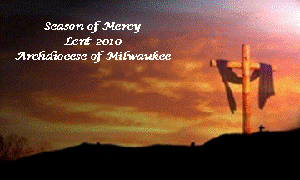 In this Season of Mercy, and as Holy Week is about to begin, it is fitting to examine restorative justice programs – the “walk,” not just the “talk,” of our faith. In restorative justice, the victim meets with the offender and facilitator in a safe place. The victim shares what happened, how it made him/her feel, and what it will take to “make things right.” The offender shares what he/she did, why he/she did it, answers the victim’s questions, apologizes and advises the victim of what he/she is able and willing to do the “make things right.”
In this Season of Mercy, and as Holy Week is about to begin, it is fitting to examine restorative justice programs – the “walk,” not just the “talk,” of our faith. In restorative justice, the victim meets with the offender and facilitator in a safe place. The victim shares what happened, how it made him/her feel, and what it will take to “make things right.” The offender shares what he/she did, why he/she did it, answers the victim’s questions, apologizes and advises the victim of what he/she is able and willing to do the “make things right.”
At the end of a successful session, the parties have agreed to an achievable, measurable road back to faith, hope and honor. Both people can reframe each other as beloved children of God, not as punk or patsy.
Is it fair to ask victims of crime to teach, reconcile and forgive? Is it fair to expect victims to be the ones who make the first move? When Jesus taught us how to pray, he included: “Forgive us our offenses, as we forgive those who offend against us.” But it is so hard to be in the place and the face of the person who hurt you. Jesus often asks us to do hard things but, as he told St. Catherine of Siena, what he asks often seems hard, but ends well.
Restorative justice programsWhere to find restorative justice
programs: Marquette’s Restorative Justice Institute Milwaukee district attorney’s program run by David Lerman Kenosha County Restorative Justice Program |
Effective restorative justice programs are victim driven. Victims of crimes are given an opportunity to show God how we want to be treated by our God for our offenses. To follow Jesus, Catholic victims should come forward and ask for the services of the program.
What God asks of us Catholics is hard, but psychological research shows that reconciliation and forgiveness are powerful healers for victims. Victims who participate in restorative justice can reframe what happened to them. They see that they are not at fault; they get closure. They get a sense of power and are enabled to be a hero – to forgive and discipline, not punish, the wrongdoer.
Jesus gave us the sacrament of confession – a victim/offender conference between God and the penitent facilitated by the priest. To forgive is an act of heroic virtue in conformity with our faith. Consider these acts of forgiveness: Pope John Paul II forgiving Mehmet Ali Agca; Cardinal Joseph Bernardin forgiving Steven Cook; St. Maria Goretti forgiving her killer, Alessandro Serenelli.
Restorative justice is not “soft on crime.” How easy is it for you to go to confession, to apologize to a person you have offended? The offender has to gather the courage it takes to man up to his wrong, face the person he wronged and suffer the consequences.
The fear, anger, bitterness and vengeance one feels as a victim can be crippling, but our faith gives us a tool I found helpful. My home was burglarized by three young men while I was away on vacation reading St. Augustine’s “Confession.” God forcefully taught me that teenage punks can grow up to become great theologians and philosophers. So, primed by God, I started praying for the unknown burglars.
All three eventually confessed after I started praying for them and I got half of my stuff back! Prodded by God, I learned about restorative justice and, in a meeting facilitated by Racine Dominican Sr. Lois Aceto, my family and I met with one of the offenders. (Sr. Lois had determined that the other two were not appropriate candidates.) After our conference, I understood why we were burglarized. I was grateful that the man confessed, apologized, gave back as much as he could and made restitution for the rest. Given his youth and attempts at honor, I did not think he deserved a felony conviction to follow him the rest of his life. My 17-year-old burglar had to plead to two misdemeanors and was put on probation until he was 21. If he completed his probation, his record would be expunged, which it has been.
I will keep praying for him and the rest of the burglars until they no longer need my prayers. I hope my youthful offender will go on to live a life of honor. I know that if he does not, I did all I could.
If you are ever the victim of a crime, remember to pray for your offender and call the nearest restorative justice program. Walk Jesus’ walk. When the time comes for God to treat you the way you treated those who offended you, you will have no fear.
(Lingle is an attorney and a member of St. Mark Parish, Kenosha.)
